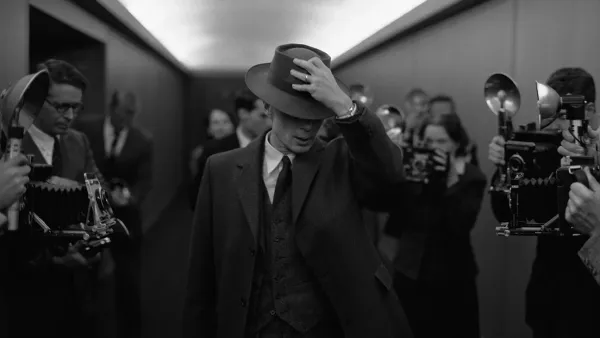The Curious Cases of Anora; Sean Baker, Intimacy, and Aesthetics Without Thought
Michel breaks down the allegations about the working conditions on Anora, and how this may be changing the context of the film's message, and reception by audiences, in real time.

At this point you'd have to be hiding under a rock to not have heard of Anora, the indie darling that swept at the Cannes Film Festival in the middle of 2024 and won a royal flush at the Oscars. The deconstructed Cinderella story went home big with 5 Academy Awards including Picture, Actress, and Director.
But not long after these incredible wins, the Crew Stories page on Instagram and Facebook have circulated uncomfortable allegations regarding production on director Sean Baker's part.
The post alleges that Anora's oft cited 6 million dollar budget was only possible at expense of below the line crew—reportedly, though adhering to SAG and DGA, the film resisted IATSE backing until it couldn't any longer, which in turn meant "the crew not only doesn't get health insurance coverage from working on the movie but is at serious risk of losing their health insurance for the year by working on the movie because you have to bank a certain number of hours on union shoots each year to maintain it."
This didn't end up happening, and the crew were able to flip the show—i.e. to make it union—and finish the work with insurance intact, yet it's reported that Sean Baker "threw a fit" and iced out crew members for it.
There have been conflicting perspectives on it as well. Commenters on the post decried it a smear campaign, how they worked on the film and saw none of this happening. The Hollywood Reporter released their article with more reach than mine to directly cite sources closer to the film: that the flip was by large a surprise to 99% of the crew, one stated, and that besides some overtime nothing was "out of the ordinary". The wages were fair: "they have particularly emphasized that the film’s wages were equitable. “I got paid fairly, and was never lied to about the budget,” wrote prop master Kendra Eaves on Instagram. Best boy grip Gabriel Armstrong and grip Rachel Parrella said that the production paid “scale” wages, or comparable to union rates, Parella adding, “[Baker] paid us the right wage from the start.”"
In all likelihood and fairness, it's possible Baker is just not quite as used to working on big productions as he is to shoestring shoots that afforded him such a free-wheeling creativity in his work. His films are intimate character pieces that thrive on being as close to a subject as possible, he has a specific and idiosyncratic approach that isn't as conducive to working with a crew (and their unions) that are less familiar to that. And it's also just as possible that the above piece was a spin to take eyes off the can of worms the post opened up. Most movie sets are a nightmare to work on, even in the best situations. Maybe both! We don't know!
But on the heels of Mikey Madison's viral interview—forgoing intimacy coordinators for the film's sex scenes (a choice that Baker put in her hands instead of mandating it on the production)—it puts a stain on this picture and the spotlight it wants to shine on its communities.

All of this is alleged, so all I can rely on is my own conjecture, and in that it serves a space to draw on the context Anora exists in, negative reception to it, and on the murk of fiction about lived aesthetics.
From Starlet to The Florida Project to Anora, Baker has made a point of his narratives to center the lives of the marginalized, the real people who eke on the fringes of American fantasy. Anora—which, in the tradition of the screwball comedy, follows on the heels of a stripper's whirlwind marriage (and later annulment) to the son of a Russian oligarch—has given to the director his biggest stage yet, and with that controversy and rightful scrutiny.
Of the major criticisms against Anora is of the thin writing of its central character. Ani Mikheeva seems the part of the streetwise hustler who knows how to play up to the tune of a John’s indecision, yet, in practice she's too much of a cipher for the idea of this sex worker with a heart of gold for her to be actively humanly interesting. Madison plays her incredibly well, like electrifyingly, but the character is just not…there. Relations in the film are transactional in a manner yes, possibly accurate, yes, bleakly realistic but also distinctly lacking and potentially disrespectful to the reality it purports.
Don't take my word for it! I often think of Marla Cruz’s essay for AngelFood magazine on Anora and Romance Labor, which I very much recommend (it’s a fantastic read). She writes:
“Anora is predicated on regressive stereotypes about sex workers: in this telling, we’re crass, impulsive, and pathologically sexual. This premise could be forgiven — there are plenty of characters whose bad behavior humanizes them into complex beings — if not for the ending’s baffling implication that it must be emotionally groundbreaking when a man shows a modicum of care towards a sex worker because sex workers have little experience being loved and cared for. What kind of love story could we expect for the broken down, unloved sex worker? [...] Anora conceives our exploitation and abuse as the most relevant factors in understanding who we are as human beings. Look how broken sex workers are by capitalism, the film says, as if society didn't already treat us as broken, exploited objects. In Anora the sex worker is exactly who society thinks she is.”
Now I've not seen Baker’s other work, I don't know the man, I'm not of the class strata of the sex worker who's being represented or in the upper echelons of Hollywood showering it with awards, yet having seen Anora twice (and having been disenchanted with it with each watch), it's in that estimate that this movie isn't really about sex workers, rather about what they represent of society.
Far from the interesting working girl of the opening 10 minutes, the Ani by the end is different and vacant and has been defined largely by the men around her, from fickle Vanya to quiet Igor. In essence Ani the sex worker is, to borrow from Sam Bodrojan’s article on the film for the Los Angeles Review of Books, a “useful rhetorical shorthand”, for all the ills of industry and sexuality and desire and money. It's in this same tenor we reduce the balking of intimacy coordinators and the possible IATSE shirking to casual nonsense discourse.
It is really great that Madison felt comfortable enough, even empowered enough under her director’s lens to not need an intimacy coordinator, yet that closed decision ignores the function of intimacy coordinators; their job is not about comfort, it's about protection for everyone within the cast—major star to minute extra, and in a field as rancid as film has been, that is indispensable. It's amazing that the film was made on such a low budget, but if crew members felt they were handled poorly—or were taken care of well—we shouldn't assume it's monolithic, and listen in with nuance. The cognitive dissonance around our favorite films, and on the workers who bring them to life, is the difference between what we enjoy, culturally, and a real person’s job.
I think Anora is a very handsome film, Mikey Madison is great, the screenplay can be very funny, and everyone who worked on it should be celebrated for their work, yet we have gotta take the blinders off the praise and sit with the mire of its contexts, all of them. Baker uses the sex worker as some sort of…Pandora’s box, even while he's humanizing them. The conversation about the ethics of sexuality in film isn't new, and it's a fascinating discourse without a rigid wrong or right. But it is important that we have it, period, and that we be open to discussing and disseminating industry sets that have so often exploited the people least insured against such exploitation.




